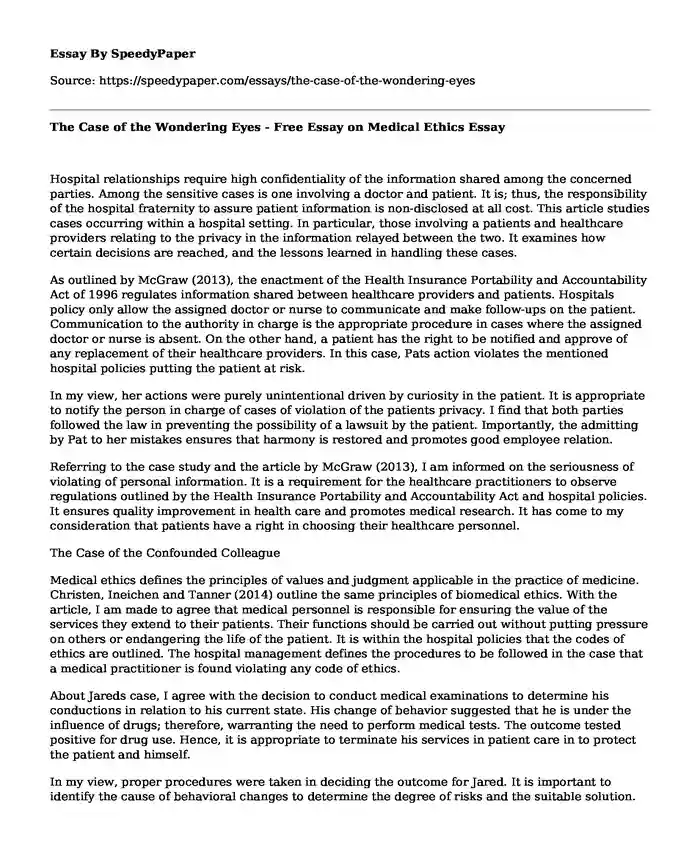
| Type of paper: | Essay |
| Categories: | Health and Social Care Medicine Ethics |
| Pages: | 3 |
| Wordcount: | 687 words |
Hospital relationships require high confidentiality of the information shared among the concerned parties. Among the sensitive cases is one involving a doctor and patient. It is; thus, the responsibility of the hospital fraternity to assure patient information is non-disclosed at all cost. This article studies cases occurring within a hospital setting. In particular, those involving a patients and healthcare providers relating to the privacy in the information relayed between the two. It examines how certain decisions are reached, and the lessons learned in handling these cases.
As outlined by McGraw (2013), the enactment of the Health Insurance Portability and Accountability Act of 1996 regulates information shared between healthcare providers and patients. Hospitals policy only allow the assigned doctor or nurse to communicate and make follow-ups on the patient. Communication to the authority in charge is the appropriate procedure in cases where the assigned doctor or nurse is absent. On the other hand, a patient has the right to be notified and approve of any replacement of their healthcare providers. In this case, Pats action violates the mentioned hospital policies putting the patient at risk.
In my view, her actions were purely unintentional driven by curiosity in the patient. It is appropriate to notify the person in charge of cases of violation of the patients privacy. I find that both parties followed the law in preventing the possibility of a lawsuit by the patient. Importantly, the admitting by Pat to her mistakes ensures that harmony is restored and promotes good employee relation.
Referring to the case study and the article by McGraw (2013), I am informed on the seriousness of violating of personal information. It is a requirement for the healthcare practitioners to observe regulations outlined by the Health Insurance Portability and Accountability Act and hospital policies. It ensures quality improvement in health care and promotes medical research. It has come to my consideration that patients have a right in choosing their healthcare personnel.
The Case of the Confounded Colleague
Medical ethics defines the principles of values and judgment applicable in the practice of medicine. Christen, Ineichen and Tanner (2014) outline the same principles of biomedical ethics. With the article, I am made to agree that medical personnel is responsible for ensuring the value of the services they extend to their patients. Their functions should be carried out without putting pressure on others or endangering the life of the patient. It is within the hospital policies that the codes of ethics are outlined. The hospital management defines the procedures to be followed in the case that a medical practitioner is found violating any code of ethics.
About Jareds case, I agree with the decision to conduct medical examinations to determine his conductions in relation to his current state. His change of behavior suggested that he is under the influence of drugs; therefore, warranting the need to perform medical tests. The outcome tested positive for drug use. Hence, it is appropriate to terminate his services in patient care in to protect the patient and himself.
In my view, proper procedures were taken in deciding the outcome for Jared. It is important to identify the cause of behavioral changes to determine the degree of risks and the suitable solution. As provided by the biomedical ethics, a framework is built that governs moral justification in promoting fairness and confidentiality in the findings.
I am made to understand the impacts of violating the code of ethics, which could attract a lawsuit by the management or the patient at risk. A misunderstanding of the condition of healthcare practitioners could also draw a lawsuit, especially when they feel violated. The steps taken in addressing a case of misconduct should be in line with the disciplinary policy of the institution. On emphasizing, there is the need to gather the right information before passing judgment.
References
Christen, M., Ineichen, C., & Tanner, C. (2014). How moral are the principles of biomedical ethics? - A cross-domain evaluation of the common morality hypothesis. BMC medical ethics, 15 (1), 1-11.
McGraw, D. (2013). Building public trust in uses of Health Insurance Portability and Accountability Act de-identification data. Journal of the American Medical Informatics Association, 20 (1), 29-34.
Cite this page
The Case of the Wondering Eyes - Free Essay on Medical Ethics. (2019, Oct 30). Retrieved from https://speedypaper.com/essays/the-case-of-the-wondering-eyes
Request Removal
If you are the original author of this essay and no longer wish to have it published on the SpeedyPaper website, please click below to request its removal:
- Law Essay Example: Sexual Assault Punishment
- Essay Example: Social Inequality in Education
- Control of Air Pollution, Essay Samples
- Free Essay with Critical and Theological Film Reviews
- Essay Example on Indigenous Australian Peoples and the Policy of Assimilation
- Essay Sample on Causes, Symptoms, Treatment and Prevention of Malaria
- Handwashing with Soap: The Key to Preventing Covid-19 Spread - Essay Sample
Popular categories




